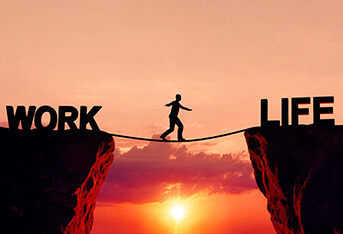Bosses across the UK are burning the candle at both ends, putting both their well-being and business performance at risk. In fact, we found that more than a third (36 per cent) of SME CEOs and business owners struggle to completely switch off from work when on holiday. This inability to maintain a healthy work-life balance is not only negatively impacting their bottom line, it’s setting a poor example for junior management and putting their own health at
The myth of a work-life balance
While many of us strive to achieve it, improve it or find it – do we really know what “it” is when we talk about having a work-life balance?
On closer inspection, the idea of work-life balance is a misnomer – an ideal which leads us to believe that our work and home lives occupy two separate spaces, divided by an invisible line. In reality, the line is hugely blurred. According to a recent study from Harvard Business School, a CEO typically works 48.5 hours per week. This is a significant amount of time in one’s life, so instead of chasing an abstract notion about the balance between ‘work’ and ‘life’, it’s time to change the conversation.
In today’s increasingly mobile and community-oriented world, work-life balance has evolved into
A healthier you equals a happier you
We all know the health benefits of eating well and exercising, yet many CEOs do not take the time to look after themselves – last year, FreeAgent found that 82 per cent of small and micro business owners worked through their illnesses, simply because they did not feel they could afford to take any time off. Ultimately, this behaviour only creates a bigger problem.
Running a business is both mentally and physically demanding, yet many business leaders underestimate the impact it can have on their mental health and the dangers burnout can have on the rest of the workforce.
Overworked business leaders make poor decisions and set a bad example for their employees, which can adversely impact organisational culture. Incredibly, 18 per cent of CEOs
Whether it’s work-life, home-life or anywhere in-between, taking a break from your professional duties are crucial to relieving stress,
Share your time (and burden) with friends and family
Typically, business owners are on their own at the top of their organisations, and perhaps only accountable to a board of directors. This solitude can wreak havoc on your stress levels – even though CEOs may be some of the most capable people in an organisation, like any professional, they will eventually encounter situations they have no experience
A report from the Scale Up Group revealed that nine out of ten business leaders in high-growth companies see peer-to-peer networks as a vital source of help, understanding the complexities of the position, and providing different perspectives to shared problems and opportunities. It is crucial to network and
Similarly, the people in your personal life are just as important – spending time with friends and family can help take your mind off work. Recognise that healthy personal relationships can help you better manage stressful situations at work.
How do you plan a guilt-free holiday from the office?
Sometimes, planning and actually taking your holiday can be harder than your actual job. Philip White, Vistage member and managing director of Audacia Consulting, follows these simple rules:
Empower your workforce: If you are needed in the office at all times, perhaps there is a fundamental issue with the company. If a business struggles in the short absence of senior executives, it is an indication of a lack of leadership at the company, and potentially signals a broader problem. CEOs and business owners must make it their charge to empower their team to think independently and to take on more responsibility.
Communicate: The higher you are in an organisation, the greater the expectation that you’ll be in some way contactable during
The key is understanding that work-life balance isn’t necessarily a complete separation of work from home life, but recognising that one doesn’t have to impede the other. Whenever you are at work, allow yourself to take some time to gather your thoughts and spend time with family and friends. However, also accept that other times you might have to take an urgent conference call from your holiday home in the middle of Easter celebrations.
Whether you are jet-setting to another country or enjoying a low-key staycation, time off is an opportunity to dedicate time to friends and family, whilst also being a great opportunity to reflect on issues and opportunities without the day-to-day responsibilities and stress of work.










